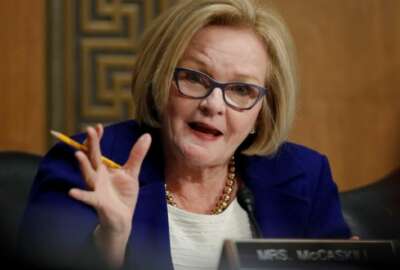
Hubbard Radio Washington DC, LLC. All rights reserved. This website is not intended for users located within the European Economic Area.
Hubbard Radio Washington DC, LLC. All rights reserved. This website is not intended for users located within the European Economic Area.
House Democrats say the Oversight and Government Reform Committee will refocus on investigations of the executive branch, questions of cabinet-level ethics and ...
Best listening experience is on Chrome, Firefox or Safari. Subscribe to Federal Drive’s daily audio interviews on Apple Podcasts or PodcastOne.
With Democrats now in control of the House, the 116th Congress is gearing up for a “sea change” on the Oversight and Government Reform Committee.
The committee’s existing members say “oversight” will surely play a fresh role in the new Congress. But members of the oversight community say the committee has plenty of room to tackle issues of “government reform.”
“It’s clear that given the divided control of Congress … there’s not going to be a ton of space for real legislating in the 116th Congress,” Molly Reynolds, a governance studies fellow with the Brookings Institution, said. “Democrats are going to look to executive branch oversight.”
Rep. Elijah Cummings (D-Md.), who sits as the likely chairman of the House Oversight and Government Reform Committee, has exactly those plans. Cummings has been the committee’s ranking member for nearly eight years.
“I have seen oversight work well, and I have seen it work poorly,” he said Wednesday in a statement. “For the past two years, it has been virtually nonexistent.”
Cummings and Rep. Gerry Connolly (D-Va.). have requested 64 subpoenas over the past two years for more agency information about a variety of topics. The Republican majority haven’t upheld any of them, Connolly said.
“We have a lot of catch-up to do in terms of oversight and accountability, and I would expect the committee will start with a measured, but ambitious and aggressive effort at oversight,” he said in an interview with Federal News Network.
Expect a heavier focus on White House security clearances, the FBI headquarters, the 2020 Census, and the Agriculture Department’s plans to relocate some 600 Washington metro-area employees to new geographic locations, Connolly said of the committee’s anticipated focus for the new Congress.
“I plan to shine a light on waste, fraud and abuse in the Trump administration,” Cummings added. “I want to probe senior administration officials across the government who have abused their positions of power and wasted taxpayer money, as well as President Trump’s decisions to act in his own financial self-interest rather than the best interest of the American people.”
Connolly said current oversight members haven’t yet decided how exactly they’ll organize the committee in the future — the number of subcommittees, their jurisdiction or their focus. He’s the current ranking member of the government operations subcommittee and stands to lead it in the new Congress — if still exists.
Good government groups and congressional oversight experts say the House committee will certainly focus attention on oversight of President Donald Trump and the executive branch more broadly.
They may issue subpoenas for the information they haven’t received under Republican leadership, if the Trump administration isn’t cooperative and communicative, said Liz Hempowicz, director of public policy at the Project on Government Oversight.
Questions over cabinet-officials’ conduct and ethics, which the 115th Congress largely ignored, will also surface in the House oversight committee.
“That scrutiny will be a major priority for our committee, and that includes former members of the government, including [EPA Administrator] Scott Pruitt,” Connolly said. “That includes current members of the government, like [Interior Secretary Ryan] Zinke.”
Though Democrats will certainly focus on the investigations they couldn’t begin over the past two years, they also plan to focus on government reform.
“Cummings has spent the last two years asking the majority to support committee requests for executive branch information, but he has also been introducing legislation and working on a bipartisan basis to pass government reform bills,” Hempowicz said.
She pointed to the All Circuit Review Act, which Cummings co-sponsored and had bipartisan support. The law codifies where whistleblowers can appeal.
“With good reform comes good oversight,” Hempowicz added.
Connolly said he envisions a “profound change” on the committee’s approach to the federal workforce.
“We’re not going to support executive-order-reorganization of the federal government,” Connolly said. “We’re going to insist that it be done by consultation with Congress, reviewed by Congress and acted by Congress. We don’t believe that the federal government can be reorganized unilaterally. We’re going to seek to challenge actions by the Trump administration that make it harder for federal employees to be represented in the workplace, to appeal unfavorable action of reviews, to allow union representation official time in the workplace. You’re going to see a sea-change when it comes to attitudes about and for federal employees. We’re going to take a stronger advocacy position on their behalf.”
Achieving pay parity between military members and civilian federal employees will be a priority, Connolly said.
He’s also working on a bill that would equalize cost-of-living-adjustments for Civil Service Retirement System (CSRS) and Federal Employee Retirement System (FERS). Today, FERS retirees have a cap on their COLA at 2 percent. No such cap exists for CSRS retirees.
Connolly said the committee is “all ears” on ideas that the Trump administration and others have to make government more efficient and effective. But he’s more concerned, he said, about reorganization “by fiat” and wants the chance to bring agency leaders in for hearings and questions about their reorganization proposals.
The proposal to reorganize the Office of Personnel Management, and recent top leadership changes at that agency, are also a concern.
“There has been virtually no consultation with us, and that will change,” Connolly said of OPM reorganization proposals.
In the Senate, oversight and accountability experts say there isn’t an immediate, apparent successor to replace Claire McCaskill (D-Mo.), who lost her seat and position as ranking member of the Homeland Security and Governmental Affairs Committee.
McCaskill was largely seen as a leader on whistleblower protections, government spending and contracting issues, and her departure from the Senate will be a “loss for the accountability community,” Hempowicz said.
McCaskill, along with Sen. Heidi Heitkamp (D-N.D.), were advocates for the Postal Service and often pushed for legislative changes to put the agency on a better financial footing.
Heitkamp’s loss on election night means HSGAC will also lose its regulatory affairs and federal management subcommittee ranking member.
As the top Democrat on the subcommittee, Heitkamp had developed a relatively deep understanding of federal issues. She and subcommittee Chairman James Lankford (R-Okla.) held a series of “fact-finding” hearings to learn more about challenges facing federal managers, roadblocks to the federal hiring process and plans for the administration’s proposed reorganization of the Office of Personnel Management.
She and McCaskill were critical of the Trump administration’s approach to government reorganization, though they expressed support for the overall concept. They pushed for more communication and information from the Office of Management and Budget on the reorg.
Ultimately, they helped strike a deal with the committee’s majority leaders on legislation to push the Trump reorganization forward.
With McCaskill and Heitkamp gone, Democrats will need to fill two out of seven seats on the Senate oversight committee, including a new minority leader.
Sen. Tom Carper (D-Del.) easily won reelection Tuesday night and is the senior-most Democratic member on the committee. He’s been HSGAC ranking member and chairman before but currently serves as the top Democrat on the environment and public works committee.
HSGAC has several relatively new members on the committee already, including Sens. Doug Jones (D-Ala.), Kamala Harris (D-Calif.), Maggie Hassan (D-N.H.) and Jon Kyl (R-Ariz.).
“Different kinds of senators tend to be attracted to serve on that committee,” Reynolds said. “It’s not one of the flashiest committees in the Senate.”
Copyright © 2024 Federal News Network. All rights reserved. This website is not intended for users located within the European Economic Area.
Nicole Ogrysko is a reporter for Federal News Network focusing on the federal workforce and federal pay and benefits.
Follow @nogryskoWFED

